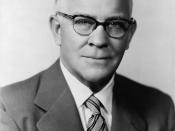Introduction:
The potency of words in the creation of character is subtle. We can just let the characters talk; it is the best way to get to know them. According to Gunter Proposition:
"A Person's Speech tells us much about his character in both senses: announces his part in the human comedy and it foretells what kind of player he will be; artful, malicious, solid or whimsical. When someone speaks, he tells us who he is and what he is like."
This study aims to reveal the characters' personalities in "Death Of A salesman" through their speech.
* Miller's successful usage of language to delineate his characters:
"Death Of A salesman" relies mainly on dialogue. Miller has used the language of the common man with great success. If we are to have a tragedy of the common man, it seems that we should logically have the language of the common man.
However, Miller's practice has not always gained the favor of critics. George Jean Nathan disagrees with Miller's contention; he says:
"The fall of kings calls for a splendor of prose or poetry, otherwise it may be quite as unimpressive as the fall of little men. But for the tragedy of the little man to be as impressive as that of a king calls as well for such treatment. Commonplace language, though it may be exactly suited to the tragedy of the underdog, may make for the first rate theatre but scarcely for first rate overwhelming drama."
On the other hand, Steiner supports Miller's contention: "Common men are prosaic. Revolutions write their manifestations in prose. Kings answer in verse." And in fact, Ibsen and Chekhov have shown that prose and economy of realism can create theatrical conventions as rich as those of verse tragedy. As Evan...


